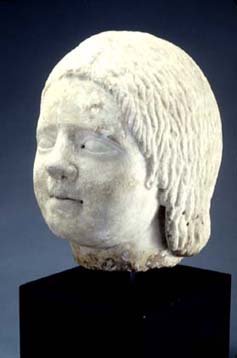 |
| Bust of a young girl. |
Every Roman's life began with the same ritual: Directly after birth, the midwife placed it on the floor. Best case scenario, Dad picked it up again, acknowledging the child as his own. Unfortunately, not every story ended so happily.
Sometimes Dad hesitated. He bit his lip. He glanced at his wife, then at the baby, and finally shook his head. A slave was dispatched to abandon the child, a practice known as exposure.
 |
| Roman father and son. |
Apalling, I know. But before passing judgement, let's take a closer look at the parents' plight. What could possibly motivate a father to expose his child?
For many, the answer was deformity. In Gynecology, Soranus gives step-by-step instructions on how to recognize a newborn worth rearing. Midwives were advised to check "that its ducts… are free from obstruction; that the natural functions of every <member> are neither sluggish nor weak; that the joints bend and stretch; that it has due size and shape and is properly sensitive in every respect." While some fathers decided to raise disabled children anyway, at least a few were cast out, perceived as a bad omen by their superstitious parents.
Even if the infant met all of Soranus' criteria, it was still in peril of exposure, especially if it was female. According to one comic poet, "Everyone raises a son, including the poor; but even a rich man exposes a daughter."
But why? What's wrong with girls?
According to custom, every bride required a dowry. And since every girl became a bride, Dad would have to dish out oodles of money, which might have been needed for that month's groceries. Girls simply weren't viable. All too often their father was forced to choose between raising them or financial stability--a situation dramatized in Ovid's Metamorphoses. Below is an excerpt from the poem, explaining a husband's prayer for his pregnant wife:
"There are two things I pray to heaven for
On your account: an easy birth and a son.
The other fate is much too burdensome,
For daughters need what fortune has denied us:
A dowry…."
Another influencing factor was Rome's callous attitude toward newborns. Cicero explains it best: "If a child dies young, one consoles himself easily. If he dies in the cradle, one doesn't even pay attention." Plutarch goes even further. "Until [the umbilical cord] comes off," he writes, "the child is more like a plant than an animal." While this attitude braced parents for staggering infant mortality rates, it may have softened the idea of exposure as well.
Finally, as Dad sent his daughter away, he may have hoped that a childless couple would adopt her. It wasn't unheard of. After all, Oedipus was raised by a king. Romulus and Remus were suckled by a wolf. At least the baby had a chance this way--although wild dogs might get to it first.
Bear with me, modern readership. I know this is a gloomy article, not everyone in the ancient world agreed with exposure.
Take the Stoics for example. Their philosophy taught that children were the whole point of marriage, and spoke against all forms of family limitation. Christians took a similar stance. Opposition to exposure became more widespread during the third century, and Constantine decreed in 331 that anyone who abandoned an infant lost patria potestas (similar to custody) over the child. Orphanages were founded during the 4th century as well, and charity was sent to impoverished families.
While Constantine never outlawed exposure, these preventative measures represent a significant change in the way that Romans viewed newborns. Raising children in the Ancient World certainly wasn't easy, but Dad had more options now, and the future was brighter for his abandoned daughter.
I'd heard about the Roman tendency to abandon some of their kids (possibly on here? Either that or TV Tropes), but never in this much detail. Great article, Ly!
ReplyDeleteThat quote from Plutarch was frightening....and it reminded me of what I see and hear in the present.
ReplyDelete